#The concept of God in different scriptures
Explore tagged Tumblr posts
Note
how do you hold them both? all powerful and all loving? i grew up in the church but have never truly found faith. i want it desperately but it feels wrong to pretend.
Hey, beloved. I wish I knew the answer to how God could be all powerful and all loving, that I could give you the secret to holding them both. But the truth is I myself don’t hold them both. At least, not firmly.
And, Anonie, that’s okay. There are some who will say that if we don’t all believe the exact same things about who the Beautiful Mind is then we worship different gods. But that’s not true. I believe that religious Jews, Muslims, and Christians all worship the same deity but simply have different conceptions of who and what that deity is. And that is fine. That doesn’t mean everyone is right, but it’s possible to have different conceptions of the same person and still be talking about the same person. The point is: I do not think rejecting the omnipotence of God makes you a heretic (not that God would love you any less). I mean first of all, what omnipotence even means is up for debate!
Here’s the rundown of my thoughts on omnipotence.
Number 1. God willingly limits himself. For God to enter into relationship with human beings and rule the world thru them (that’s part of what image of God means) than he has to willingly put limits on himself in order to respect the dignity of the well meaning but foolish dirt creatures he created. This is a view held by both Conservative and Reform Jews and also by open theist Protestant Christians. This is a position known as open theism (which started as a movement dedicated to the rejection of Greek philosophical influence on Christianity, which as a goal I can get behind).
A metaphor my favorite bible scholar uses is that of a ship: human history is a ship headed from one port (good creation) to another port (the full union of heaven and earth). That WILL happen. The boat will not sink or get lost or etc. the boat will get from port A to port B. But, what happens on the boat (and who’s still alive vs who dies) before we get there… that’s up for grabs. I refer to this as “ordained” vs “unordained” futures. The Incarnation of the Wisdom/Word? Ordained. The Transgression of Adam and Eve? Not ordained.
Number 2. I had to just be honest with myself and with God about my reaction. I had to sit down down and seriously think about it: what would I prefer? A god who is all powerful, or a god who is all loving? When I look at the person of Jesus of Nazareth, what do I see more? For me the answer is obvious. “God is Love.” Not all loving; God is an eternal community of other-centered, life-giving, intimate love. That is what it means to believe in the Holy Trinity. And honestly I’m not torn up about it. I still believe that God is “Beyond Being” and “The Ground for whom there is no ground.” I still believe that God is THE MOST powerful. But if it comes between all powerful and all loving; Jesus taught me to define power AS love. “Power” to the Christian properly cognizant of the totality of scripture is “to empty one’s self in the name of Love and to choose Life and Forgiveness over Death.”
This is not an orthodox Christian answer, but we can’t expect to have everything figure out. At least, not this side of the resurrection. Unlike the medieval scholastics, I can handle some mystery in my life. I think this would do you well.
Also one last thing: God doesn’t want your pretense or pretending. God wants your rawness. Read Job; there is nothing soft about it and he does not bother with pretending. He named it how he sees it (that God Almighty is a moral monster who fucks with the lives of humans when he isn’t just ignoring them entirely). And God (after telling him to chill out because. Presumptuous much), says that Job has right relationships with him.
May the God of loyal love, Mother of the exiles and Restorer of the refugees, look upon you with favor and give you wholeness. Amen.
#something to meditate on#christianity#christian#jesus christ#jesus#keep the faith#faith in jesus#faith#bible#open theism#christblr#christian faith#christian tumblr#bible study#bible verse#christian blog#progressive christianity#progressive christian#queer christianity#queer christian#lgbt christian
27 notes
·
View notes
Text
i've mentioned this vaguely but... adam IS sworn to virtue and chastity, as an angelic knight, as his duty is devoted to serving heaven and he's not supposed to indulge in any temptations of the flesh. obviously, he doesn't adhere to this strictly. but he does, inwardly, feel somewhat guilty about it. he does consider it a sin / or at the very least, breaking his vow. so, he's generally not very open about any such affairs, nor does he actually sleep around often. ( especially while in heaven! if he indulges, it's usually down in hell. )
#⅋ . 𓆩 ( ch . study ) — you let man see god once / & he'll learn to make a country out of anything. 𓆪#it's a mindfuck because he was CREATED as the first man with the intent to populate the earth.#( eve's not around tho technically he's... widowed? estranged? )#but he's been 'promoted' to the archangel choir so there's different expectations. he's not supposed to get distracted.#because i LOVE the concept of his innate humanity clashing with his newfound divinity.#in scripture angels traditionally are seen as lacking free will. designed as tools for god to wield. they have a job to do.#so i'm toying with that concept.#he's just a weird case.#( there's been like no writing on my blog for a while and i said no headcanons AND YET- )#( anyway i want more heaven lore. hello 😇 we should plot. )
21 notes
·
View notes
Text
ATSV Fun Fact!! - Mumbattan Cultural Details
Gayatri & Inspector Singh follow the Sikh Religion

Have you ever heard of Punjabi Sikhs?
If you don't know - Sikhism is a religion that originates in northern India, specifically Punjab.
The turban Gayatri's father wears - along with his last name 'Singh' implies that her father is most likely a Punjabi Sikh.
I notice this the first time watching ATSV and was like 'wow that's so cool :)'
It only hit me today that 'Oh wait I don't think a lot of people know about this very-specific, rarely-mentioned religion maybe i should say something,'
And because I LOVE yelling about world culture, LET'S GO!!!
[a SHORT essay where I explain the basics of Sikhism, a religion built on equality and justice. And details in The Singhs design, and exactly why Sikh Representation matters]
So What's Sikhism about?
Often mistaken for Muslims - Sikhs are actually a non-Abrahamic religion, with 20 million followers worldwide.
But even with so many visible practicing members, most people know very very little about this beautiful religion!
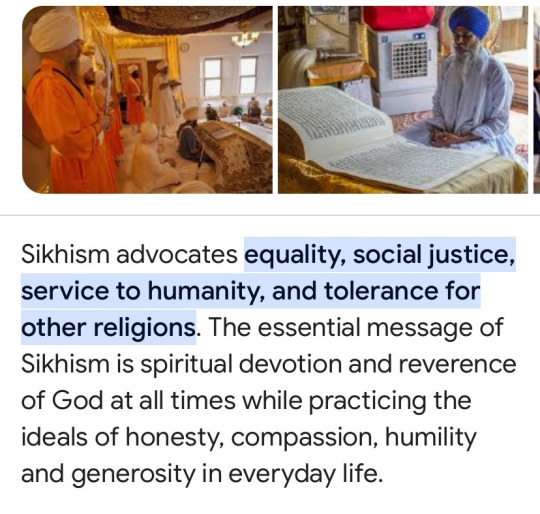
Sikhs believe in equality and unity - and defending the oppressed. Their book of faith, The Guru Granth Sahib Ji, is called 'Guru' for a reason - Sikhs see the book as not just a code of conduct, but as a living, breathing teacher for every practicioner;
From Wikipedia on Guru Granth Sahib: Sikhs since then [1708] have accepted the Guru Granth Sahib, the sacred scripture, as their eternal-living guru, as the embodiment of the ten Sikh Gurus, the highest religious and spiritual guide for Sikhs. It plays a central role in guiding the Sikh's way of life.
The Guru Granth Sahib is the spiritual leader of Sikhism, and it's treated as such.

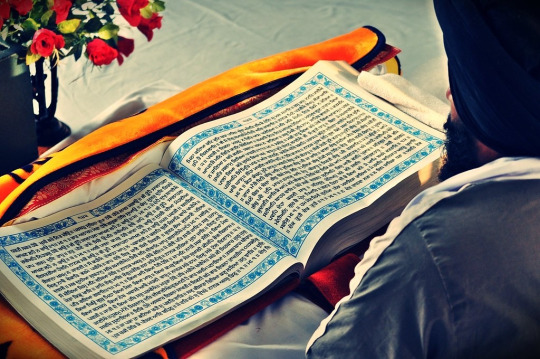

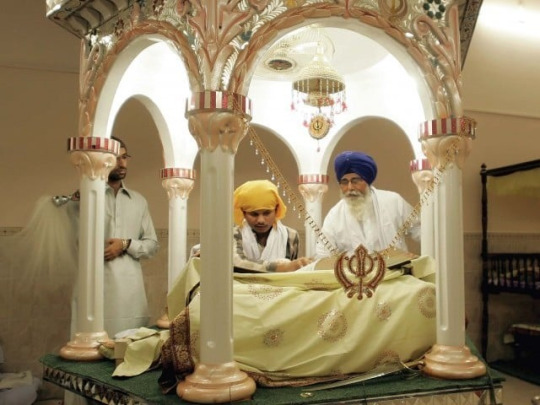
That's why in Gurdwaras - their place of worship - it's treated as such, being clothed and held in ornate structure, constantly fanned throughout it's readings (the fan you can see in the left picture).
They believe that by following the Guru Granth Sahib Ji, they can cultivate compassion, peace, and harmony in their communities, while diminishing 'Mara' - concepts like hatred or violence.
Sikhs believe that every Sikh should revere themselves as champions of unity. And because of this many Sikhs have the same last name -
Kaur for women (Meaning Princess) and Singh for men (Meaning Lion).
Having the same last name also does away with the Indian caste system, making it another point of equality.
In ATSV Gayatri last name is Singh. However from my understanding, her name would most likely be Gayatri Kaur in reality.
I think they kept her last name as Singh as a deliberate choice to keep her initials as GS, like Gwen Stacy.
So is Gayatri Sikh?

Maybe - most likely.
But we can't be sure. Mainly because of her hair.
Gayatri has a short bob haircut, and while that might not seem like it matters, it does!
In Sikhism there are the '5K's - different aspects Sikhs wear to show their faith.

Notice the first one?
'Kesh' is the practice of leaving ones hair completely uncut. That's why you may see a lot of Sikh men with long, long beards!
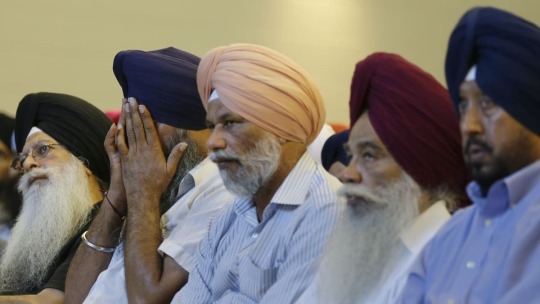
And hence, the large turbans.
It's done as respect for God's creation - leaving it unaltered.
[Fun Fact! - Rastafarians, a Jamaican religion, also don't cut their hair for this reason. Think Bob Marley. Rastas call God - Jah]
So, Gayatri having short hair means she doesn't keep Kesh.
However, Sikh is a super accepting and open religion, and it's main focus is on acceptance of difference, not conformity - so she could entirely follow the faith without doing all of any of the 5Ks.
Also, if you're curious about the steel sword K - Kirpan, yes that's a thing!



Sikhs of all genders are encouraged to carry a small ceremonial blade with them.
Instead it's a symbol of the commitment to fighting for what's right - and defending those who cannot defend themselves.
A Kirpan can ONLY be used to defend the life of yourself or others, which is incredibly rare.
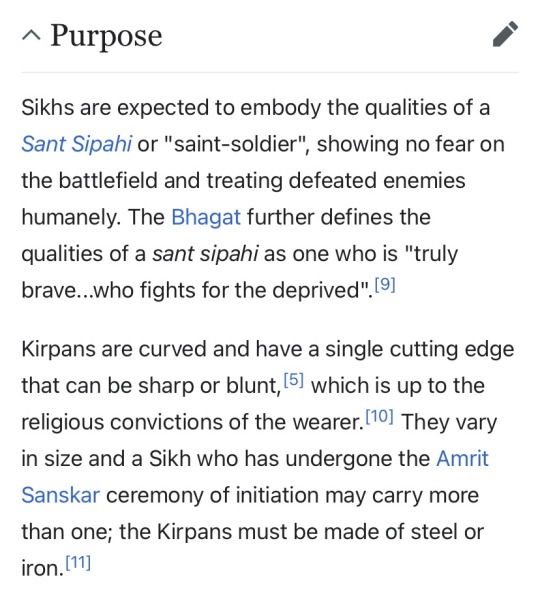

Why is this all so rad, cool, and important?
If you haven't noticed by now, Sikhism is a religion driven by justice. Not just in theory, but in really life as well.


That's why you may see many Sikh police officers and politicians, even here in the West. Most of them wearing the emblem on their turbans.
In fact, Canada has SO MANY Sikh politicians, that in 2019 they elected 18 of them.
For centuries Sikhs have been dedicated to justice, and developing systems of support, whether that be political involvement or feeding those in need.
The biggest Gurdwara (a place of Sikh worship) The Golden Temple feeds over 100,000 people A DAY.
For FREE.
It's a practice called Langar. A communal meal anyone can enjoy. And of course, Langar food is vegetarian.
Making Inspector Singh a Sikh - and showing him saving people and being warm to his daughter on screen is great representation for a community so often overlooked! Despite the fact they are over 20 million practicing Sikhs.
It's a great detail for Indian and Punjabi representation in specific. It accurate shows their beliefs and commitment towards helping others, no matter the cost.
And from what we can tell, this choice came later in development. We know this because ALL of his concept art shows him with a turban, not keeping Kesh.
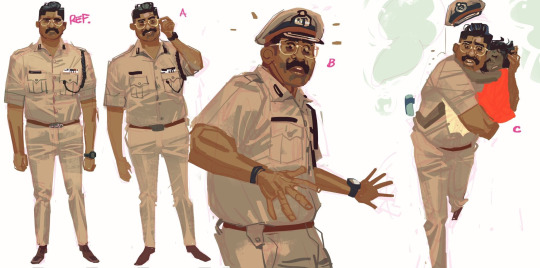
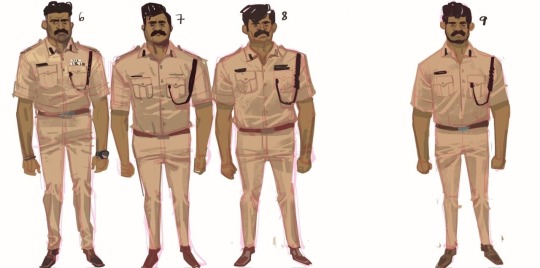
It seems like someone later on down the line said 'Wait if his name is Singh I think he's Sikh and if he's Sikh then we're gonna have to redesign him and make that obvious oops'.
That, dear audience, is why you always have an Anthropologist in the writing room. Or some amateur anthropologist like me :)
-------------

I hope you enjoyed reading this, I really enjoyed writing it!! Sikhism is one of my favorite religions and if you have never heard anything from the Guru Granth Sahib I HIGHLY recommend it, it's very optimistic and compassionate. Sikhnet(.)com is also a great resource!
I have no idea if this will pique anyone's interest, but I hardly ever see Sikhs reflected in media and I know many many people may confuse them with Muslim, especially since many women Sikhs keep kesh and cover their hair as well.
But if you ever wanted to know the difference, here it is! If you read this far, thank you SO MUCH. And if you're a Sikh and reading this, I LOVE YOU SO MUCH.
As usual, here's a photo of Hobie for your travels.


BYE.
#Did yall know about this? Idk know is any of this is common knowledge im gonna be real dugshjdgjks#It's a GREAT detail its so small but I love it#no proofread you get what i meant#and of course if you have any info to add or correct me on#feel free!! I wanna spread accurate info :)#spiderman#atsv#spider man#marvel#across the spiderverse#pavitr prabhakar#atsv meta#atsv meta analysis#meta#meta analysis#spiderman india#spider man india#pavitr#atsv pavitr#gayatri singh
509 notes
·
View notes
Note
what are sunnis and salafists? sorry that this out of nowhere im a white anon so i dont know alot and you can ignore this if you want
Sunnis are adherents of Ahlul Sunnah wal Jumu'ah (the people of the Sunnah) or the Sunni branch of Islam. It constitutes the majority of followers of Islam, with Shi'as being the second largest group of Muslims. The name is derived from the term Sunnah, which means Prophetic traditions and practices.
Historically, Sunni Islam did not originate at the onset of Islam and following the historical disagreement regarding the successorship of Muhammed (pbuh&hf), but is rather the culmination and consensus of centuries of legal and scholarly opinions, debate and theological studies, thus is it is a misconception to assume that Sunnism was brought about during the political schism in the early years of Islam, whereas Shi'ism were a partisan group before forming its own theology and jurisprudence a century later. Sunni Islam derives its laws and jurisprudence through the Qur'an, Sunnah, consensus and analogical reasoning. Sunni Islam is represented by four school of thoughts: the Hanbali school, the Hanafi school, the Maliki school and the Shafi'i school. Each school of though represents a particular geographic location, and lay people following Sunnism may follow the scholarly opinion corresponding to their geographic origin and location. Most Sunnis follow the Maturidi and Ashari rationalist schools of theology and rely on scriptural sources to derive their understanding regarding God's nature and the material and metaphysical reality.
Salafism is a reformist/revivalist movement within Sunni Islam that holds that the purest form of Islam can only be derived through the opinions and practices of the honorable ancestors (Salaf al-Saleh). They hold that the best generation of Muslims were the Sahabas (companions), the Tab'iun (the second generation) and the Taba al-tab'iun (The third generation), according to a prophetic tradition, viewing later interpretations of Islam as innovations or deviation from the Qur'an and the Sunnah. They believe that only through the Salafs can absolute monotheism be understood and that anyone who rejects them or derive different opinions are deviants or heretics, such as the Shi'as (and some Sunnis), who venerate saints. They reject the concept of Taqlid (emulating), that is, following the four schools of thought, holding that ijtihad (independent reasoning) takes precedence over Taqlid through the study of the Qur'an, the Sunnah and consensus of the Salaf al Saleheen. Salafists tend to reject the rationalist schools of mainstream Sunni theology and adheres to a literalist and traditionalist (Athari) interpretation of Islamic theology as understood from classical scholars such as Ibn Taymiyyah, Ibn Kathir and Ibn Qayyim. They may also derive their understanding of religion through the legal opinions of other modern Salafist scholars. There are several Salafist movements, such as Madkhalism (the quietist school), Wahhabism, Salafi-Jihadism, Ahlul al-Hadith and etc. Salafists are known for their puritanical view on Islamic monotheism and literalist interpretation of scripture, hence their intolerance toward other co-religionists that do not conform to their religious interpretations. They most notably hate Shi'a Muslims.
116 notes
·
View notes
Text
If you liked Camp Damascus, try Hell Followed With Us
and vice versa!

There's a lot to love in both Camp Damascus by @drchucktingle and Hell Followed With Us by Andrew Joseph White. As horror novels about queer youth with, shall we say, complicated relationships with religion, they have a lot in common - if you liked one you very well may like the other. Let's take a closer look.
Characters:
Both books feature queer, autistic youth fighting back. The characters are trying to survive in a world created for them by abusive adults and religious institutions that hold power over them.
In Camp Damascus we follow Rose (autistic, lesbian). In Hell Followed With Us we follow Benji (neurodivergent, trans) and Nick (autistic, gay).
Genre:
Both books are horror, but with two distinct flavors. Camp Damascus has more of a creepy factor, while Hell Followed With Us leans more toward gore. In Camp there is some mystery to the evil, but in Hell the evil has a name, a face, an address - and a to-do list.
Both books deal with Christian cults and the horrors of indoctrination. They deal with the characters' complicated relationships to Christianity as an institution and God as a concept. They also both quote Christian scripture heavily.
Vibes:
While both books are horror, they do feel very different, largely because the primary emotion that drives each story is different. In Camp Damascus, it's love. In Hell Followed With Us, it's rage. You'll certainly find both emotions in certain quantities in either novel, but what they primarily put forward distinctly changes the vibe of both books.
-
So there you have it! Two fantastic reads in close thematic conversation with each other - but still quite distinct. If either sounds good to you, do yourself a favor and check out both today!
See more of Robin's recs
#camp damascus#hell followed with us#andrew joseph white#chuck tingle#lgbtq books#lgbtq reads#lgbtq authors#lgbtq characters#horror#horror novel#queer horror#book review#book recommendations#books and reading#booklr#book recs#LCPL recs#robin's recs
503 notes
·
View notes
Text
What is Virodha Bhakti?
There is something called 'Virodha Bhakti' in Hinduism. Many scholars agree with it. Shri madhwacharya explicitly mentions Virodha bhakti. It's a kind of bhakti where you hate God. An intense hatred towards God. It is a way of finding moksha from hate towards God.

Shri Madhvacharya outlines different types of relationships or attitudes (bhavas) toward God, including:
-Sakhya Bhava (friendship)
-Dasya Bhava (servitude)
-Vatsalya Bhava (parental affection)
-Madhurya Bhava (romantic love)
-Virodha Bhava (opposition or antagonism).
He explains that Virodha Bhava involves an oppositional attitude, where one is constantly engaged with God through emotions like anger, jealousy, or hatred. This intense focus, even if negative, ensures remembrance of the divine.
Examples in Scriptures:
-Shishupala (in the Mahabharata): Shishupala constantly thought of Shri Krishna, albeit with enmity and hatred. Eventually, this intense focus led to his liberation (moksha).
-Kamsa (Krishna's uncle): Kamsa lived in perpetual fear of Shri Krishna, but his obsessive focus on Shri Krishna indirectly became a form of devotion.
-Ravana’s death in battle at the hands of Shri Rama is seen as his liberation. His pride, hatred, and desire for revenge kept him obsessed with Shri Rama. His focus on Shri Rama, though oppositional, brought him into the divine fold.
I don't think normal human beings like us can do Virodha bhakti. Mostly, it was found in Rakshasas(demons). But still.. I wanted to point out that our Hinduism found a way of reaching moksha even in hatred. It's an amazing concept.
55 notes
·
View notes
Note
it is absolutely not necessary to believe in a literal body resurrection to be Christian. this literalization of important stories does not make things more real.
for many people a literal body resurrection and a literal general resurrection of the dead are very definitely non sensical.
we are not bound to the 4th century worldview. the way Christians have understood Christianity has always been subject to evolution. the creation of the literal bodily resurrection you can see evolve in the new testament
Paul and Mark have no bodily resurrection. Matthew has visitations but in a way similar to the theophany @ sinai, a coming down from heaven.
John and Luke as the latest gospels have mixed aspects of their experience. experience that indicate a bodily resurrection tradition was. beginning by then.
I have to respectfully disagree. If you don't believe Jesus was physically raised from the dead then you are not believing the gospel. If a literal bodily resurrection is non-sensical, how do you deal with the raising of Lazarus? Do you pick and choose which of Jesus' miracles to believe in? Biblical literalism is not necessary in all cases, many parts of the Bible are written like poetry or literature to give us a better understanding of God, like the creation stories in Genesis, but this is not the case with accounts of Jesus' life. The gospels repeatedly ask you to believe the seemingly unbelievable. I'm not going to quote a load of scripture at you, but the New Testament does not support your view on this.
It is necessary to believe in the bodily resurrection of Jesus Christ as a Christian because God conquering human death is the foundation of our faith. Otherwise, what makes Jesus different to Elijah, who was taken up to God? The physical resurrection cannot be extracted from the belief of Jesus as our saviour. Plus, the Bible explicitly shows us that Jesus' physical body is resurrected, with Thomas touching Jesus's wounds still present on his body from the crucifixion.
Also, you imply that you believe Matthew and Mark to be true over Luke and John, because they came later and due to reasons of plausibility? Do you believe the gospels are divinely inspired or not? Don't get me wrong, you can be both a religious scholar and a Christian, but to be one doesn't make you the other. Being a Christian requires belief.
Also *out of breath* the Nicene Creed. God give me strength why does everyone think they just know better. It contains everything mandatory to believe to be a Christian.
"For our sake he was crucified under Pontius Pilate, he suffered death and was buried, and rose again on the third day in accordance with the Scriptures. He ascended into heaven and is seated at the right hand of the Father."
Died -> buried -> rose -> ascended, not died -> buried -> ascended. There is no ascension without resurrection. The literal belief in THE key foundational concept of Christianity does in fact make things more real. Otherwise what is your faith based on?
#asks#christianity#jesus christ#the resurrection#resurrection of jesus#catholicism#nicene creed#theology#Christian faith#christian theology
71 notes
·
View notes
Text
📖 Myth & Sacred Scripture 📖
In Hellenic Polytheism and Mesopotamian Polytheism (and others but I don't want to speak for them) there is no sacred scripture where the words of a God are given to a myth writer and that writing is then declared holy by some form of religious authority.
The idea that myths are the literal actions of the Gods come from a concept of sacred scripture. Sacred meaning the words have holy implications or they have a fundamentally important connection to the divine. This understanding of religious writings is demonstrated in:
Protestant Christianity where the Bible is divinely inspired (usually derived from 1 Timothy 3:16 & 2 Peter 1:12). Additionally, in Trinitarian Christianity Jesus is God making his words in the Gospels the literal words of God.
Islam where the Quran are the words of God given to Mohammad via the angel Gabriel over the course of his life.
Judaism where traditionally the written Torah are the words of God given to Moses at Mt Sinai.
**There are more examples but I'm not going to try and talk about something I did not study.
This pervasive idea of scripture being the words of God embeds itself into a general view of what religion supposedly is because:
Christianity is the largest religion in the world.
Christianity is the dominant religion in English speaking countries, so when we have these discussions in English it tends to have that cultural Christian viewpoint.
Islam is the second largest religion in the world.
Islam considers the Jewish and Christian scriptures to also be given from God, but they have been corrupted in one way or another. This combination can put a mistaken emphasis on sacred scripture being a fundamental aspect of religion.
Even though Judaism is a very small religion the the written Torah is considered part of the Christian Old Testament (first five books). Christians interpret the scripture completely differently but the idea of Moses receiving the Word of God at Mt Sinai continues into Christianity from Judaism.
In many "dead religions" the closest you can come to the "words of the gods" might be the writings of ancient oracles or those who communed directly with spirits & gods. However, in Greece and Mesopotamia there was no centralized religion or continuous tradition to overview and canonize them into sacred scripture. Additionally, those are not usually what people are talking about when they refer to myth.
Myth is extremely important, but mythic literalism is a misstep people make, often due to our preconceived notions of sacred scriptures and their connection to the divine.
-dyslexic not audio proof read-
-I hope this makes sense-
#in my educated opinion?#paganism#hellenic polytheism#polytheism#helpol#myth#sacred scripture#levpag#pagan#polytheist#mesopotamian polytheism#i was writing this in another post#and it was getting so long i thought it might just be better to make it its own#i really hope this makes sense#im very tired#and my brain doesn't like functioning anymore#i genuinely do not know if my wording makes sense any more#even when i re read it sometimes it sounds write and other times i feel like im reading gibberish#gods i need that neurology appointment#this wasn't editing a repost so thats why i worry#ofthetheoi#landof2rivers#steppingontoes
104 notes
·
View notes
Text
Mythological Inspirations: Matar Paneer Cookie Edition
So, where did Matar Paneer- nah I don't feel like making this joke again. Indian curry dish + crazy lion lady + demon slaying goofball pretty boy. BOOM.

Next installment of "Merchant rants about how far she went designing these fankids into a void for 10 hours"
Same as/with/for Pepper Jack, I researched and took inspiration from Egyptian and Hindu mythology while drafting up Matar Paneer. If Golden Cheese is Ra, and Burning Spice is Shiva, and Pepper Jack is the bennu bird + Ganesha... what does that make our little lady here?
Remember how Shiva has two sons? Jack is already one, so Paneer is, naturally, the other one. She takes after Kartikeya, second son of Shiva and Parvati, god of war and victory.
Kartikeya's primary color is red. So Paneer's is, as well. It's her favorite color and what she likes to wear the most. (It's also partially because of Burning Spice lol. Red will always = Papa to her to some degree)
Kartikeya is armed with a divine spear called Vel, which was a gift from his mother. Though Paneer wields and favors her katar, she will one day carry a spear alongside them, also a gift from her own mother (can't wait to tell that story haha)
One of Kartikeya's symbols is a peacock; this is because he has a giant peacock (named Paravani) as a mount. Likewise, I had Paneer befriend a peacock, which will one day grow big enough for her to ride around on herself (can't wait to tell that story either! I personally like my little interpretation of Paravani. Matar Paneer and her little bird bestie haha)
Kartikeya has a very innocent and playful personality; he's quite silly and mischievous, and likes to mess with things for fun (ex: messing with planets' orbits, stacking mountains on top of each other, stopping the flow of the Ganges river, etc). Paneer is quite similar (something else I didn't know beforehand, I swear. Paneer being a little gremlin just like the god she ends up taking after is another happy coincidence), going on little adventures and making messes and having... destructive tendencies like her Papa lol. (But she never means any harm. She's a good kid, she's just a bit impulsive and reckless)
Sometimes, Kartikeya is depicted with six heads (varies by scripture). Bit of a stretch, but I thought of having Paneer own six masks, each one wildly different from the other, that she'll often wear for fun. (I'll explain this better in another post)
Kartikeya is credited with defeating many monsters and demons, minor and major. So Paneer will grow up to become a renowned demon slayer, just like him (spoiling the end of her story there lol)
Golden Cheese is clearly inspired by Ra, Egyptian god of the sun and head of the pantheon (it's extra obvious with her Awakened form lol). The stories vary wildly from what I've seen, but the most baseline concept is that Ra has 3 daughters. Believing her to be the most fitting, I chose to have Paneer take after Sekhmet, Egyptian goddess of war, chaos, plague and medicine.
Sekhmet's primary color is also red. More red for our little lady. (All the war gods like red, so predictable smh)
Sekhmet is extremely violent and bloodthirsty, as her profession suggests. Born from the fire in Ra's eye, her main purpose in life is to protect him, help uphold cosmic order, and punish mortals for disobedience towards either. Paneer is... quite temperamental lol. Very strong-willed, very easily frustrated, very emotional. Fiercely protective of those she loves. And she can be... vengeful. Very, very vengeful. I will not elaborate further because it's spoilery as fuck lol
Like most of the other gods, Sekhmet is a furry part animal, with a woman's body and a lioness's head. Also a bit of a stretch, but... a certain young lady is getting a lioness tattoo on her back when she's an adult, as a nod/homage haha. Also, Golden Cheese's special nickname for her is "little lioness"
Sekhmet is often depicted with a lotus in one hand, and an ankh in the other. There, now you know why Paneer has a lotus in her hair lol (she's also getting an ankh tattoo when she's an adult, on her left wrist since that's the hand Sekhmet is always seen using to hold it (Paneer is getting a lot of tattoos when she's older, as you can see))
The Egyptians very much believed in names having power (common idea in the ancient world, really, but they were extra into it), so Sekhmet, like all the other gods, has like a billion names lol. To keep things simple (I counted 15 names the first time I looked into her and I'm pretty sure there's more), Paneer only gets a few: "Red Lady" (this one in particular), "Lady of Slaughter", "Mistress of Dread" and "She Before Whom Evil Trembles". The first three, people in general give her as a result of her actions/accomplishments (demon slayer, remember?) and are meant in a positive, reverent way (sometimes with a small touch of fear, admittedly). The last one is what High Priest Cheesenbird calls her. He has a term of affection/endearment for both children
Sekhmet can breathe fire; in fact, the Ancient Egyptians often credited/associated her with the hot desert winds because of it. I think I said this before already, but Paneer is a fire breather, too (she can light her hands and feet on fire, as well. Not a full-on firebender but not too far away)
In an interesting contradiction, Sekhmet is a goddess of both disease and medicine. She's bitter and wrathful, and causes plague outbreaks as a form of punishment for mankind... but she cures them, too. She's feared and looked to for salvation at the same time. She's even considered a patroness of physicians and healers. So... Perhaps our little firebreather has a hidden knack for healing, too. A secret power. One that's only noticed by another healer who would know how to spot and nurture such a talent *cough*Pure Vanilla*cough*. Maybe. Perhaps 🤔🤔🤔🤔🤔
Also, here's some doodles of more general things just because

There's little Paravani lol. Hopefully I actually start improving as an artist eventually, so I can draw Paravani better (or more in line with how he looks in my head. I don't really want a regular looking peacock, that's boring)
There's the little cheese lotus Paneer wears in her hair. Just used the one in the Golden Cheese Kingdom decor set as a reference 😅
Ankhs r cool 2 draw. Also, fun fact: they symbolize immortality and reincarnation. Reminds you of her mom, doesn't it? Haha
Tried to draw her katar (Indian knives. Basically Wolverine claws). They were a gift from Cilantro Cobra (she's alive and well in my personal canon ok 😫), and she went the extra mile to have little symbols engraved in both. Burning Spice's in one, Golden Cheese's in the other
She's supposed to have little green earrings that look like green peas ("matar" means green pea, "paneer" is the Indian cheese. Literally "green pea cheese" lol). Her design references the food she's supposed to be a lot more than Jack's, I think
Ok I'm done now. I'm sorry this post was so late. I'm also sorry this is all on paper and in shitty ass lighting, me no have drawing tablet. Thank you for coming to my TED Talk
#someone please tell me I'm actually getting better at art lol#I'd like to think I am... you can't improve if you don't try in the first place right?#please be patient with me regardless I'm trying my best here. Someday I'll be capable of more than grade school scribbles#cookie run kingdom#burningcheese#goldenspice#cookie run fankid#cookie run oc#matar paneer cookie#also I hope you guys like Paravani haha#can't think of a more... Cookie Run sounding name atm. So he's just Paravani for now
52 notes
·
View notes
Note
I'm a lifelong Christian and I've been struck with fear recently because I've never feared God. I love God so much, but I cannot fear anyone whom I love. Those two things can't go together in my mind. I think of 1 John 4:18 and I justified, but then I think of all of Proverbs (wisdom is the fear of God) or even some of Jesus' sayings (ex. Luke 12:5)... and I start feeling like a horrible Christian because I just can't imagine loving someone that I'm afraid of. I guess I am afraid sometimes of God showing me my guilt when I sin, but I'm not scared of God sending me into eternal hell or anything, because I wouldn't be able to believe in a God who'd do that to anyone. Is there another way to think about "fear of God"?
What a great topic, beloved! The answer is yes, there are many ways to think about the concept of "fear of God!"
The first thing I want to bring up is that we have to be careful about moralizing emotions. As someone with a mood disorder, I know all too well that when we do this, we alienate people with emotional differences, and we also fundamentally misunderstand a lot. We cannot control our emotions. We can choose between reveling in them or moving on from them, we can learn ways to process them, we can identify whether they're helpful, but we cannot control them. Because of this, we cannot require certain emotions as a virtue. It's not realistic or helpful.
Fear, the way we usually talk about it, is an emotion. It can be a logical response or a completely illogical one. Someone with an anxiety disorder may experience fear in perfectly normal situations; someone with paranoia or a phobia may be afraid of completely safe situations. We may not feel fear in an unsafe situation because of recklessness or ignorance.
Emotional responses to God are varied and uncontrollable—although with religious education and emotional intelligence, they can be useful. We can process our guilt to decide whether it's pushing us to change or keeping us trapped. We can process our joy and cherish when it is a response to holy things. We can let anger lead us to work for justice. We can honor our grief at injustice but work to not let it paralyze us. We can love worldly things or eternal things. Again, I don't want to moralize emotion, but rather honor it as a part of the human experience and use it to serve God.
You're afraid because you don't fear God—this comes out of a desire to be a "good Christian," to cultivate in yourself what is holy. Ironically, your fear is leading you to God, the kind of fear you were afraid you didn't have. Now if fear of being a horrible Christian traps you, if it causes you not to care for yourself, if it keeps you from experiencing the joy of Christianity, we know it isn't serving you. But it can, and it may be doing so right now, pushing you to think further about this.
To see fear as a virtue, though, we have to look beyond uncontrollable emotional responses. We have to see it in Scripture in all its many facets. You have identified two completely different verses on fear—showing us that fear can be can be the enemy of perfect love, and also a logical response to a God that has ultimate power. Fear can prevent us from reaching out (being afraid), or it can be an awareness of our own lack of power, our dependence on God, and result in surrender. Anxiety is a shutting in; reverence is a reaching out.
I cheated and used the Wikipedia page to find this, but Pope Francis said that
The fear of the Lord, the gift of the Holy Spirit, doesn’t mean being afraid of God, since we know that God is our Father that always loves and forgives us,...[It] is no servile fear, but rather a joyful awareness of God’s grandeur and a grateful realization that only in him do our hearts find true peace.
We don't fear God because we don't trust him—we fear offending God because we love God, we fear losing God because we are completely dependent on God, we fear forgetting God's love because that's the only meaning in the universe.
I've really valued C.S. Lewis's perspectives on fear—I don't have The Problem of Pain with me right now, but the Wikipedia page for "numinous" helpfully quotes it:
Suppose you were told there was a tiger in the next room: you would know that you were in danger and would probably feel fear. But if you were told "There is a ghost in the next room," and believed it, you would feel, indeed, what is often called fear, but of a different kind. It would not be based on the knowledge of danger, for no one is primarily afraid of what a ghost may do to him, but of the mere fact that it is a ghost. It is "uncanny" rather than dangerous, and the special kind of fear it excites may be called Dread. With the Uncanny one has reached the fringes of the Numinous. Now suppose that you were told simply "There is a mighty spirit in the room," and believed it. Your feelings would then be even less like the mere fear of danger: but the disturbance would be profound. You would feel wonder and a certain shrinking—a sense of inadequacy to cope with such a visitant and of prostration before it—an emotion which might be expressed in Shakespeare's words "Under it my genius is rebuked." This feeling may be described as awe, and the object which excites it as the Numinous.
Proverbs states multiple times that the fear of the Lord is the beginning of wisdom—not guilt, not an eternal state of being afraid, not self-hatred, not doom. When it is an understanding of our dependence on God, our recognizing how small we are and how much power God has, when we realize that everything real to us is a pitiful reflection of what is in store, that is where we find wisdom in this life.
Proverbs also tells us that to fear the Lord is to hate evil (8:13). 16:6 says that evil is avoided through the fear of the Lord. Job 28:28 tells us that the fear of the Lord is wisdom, and to shun evil is understanding. We see here fear of God leading us to good works and obedience—if it's not leading us anywhere, it's stagnation. (The same with guilt.)
Another place fear of God leads us is life and rest (Proverbs 14:27; 19:23). Fully understanding and submitting ourselves to God, knowing how afraid we would and should be without that rock, we can rest knowing that we have God, the fountain of life.
Another interesting thing besides evil that fear of God is set against is arrogance/pride. Romans 11:20 says, "Do not be arrogant, but tremble." Proverbs 22:4: "Humility is the fear of the Lord." When we set ourselves as the center of the universe, when we think we're in control, when we cling to earthly things, we are not in that state of reverence.
Fear of God is holy—but over and over, God tells us to not be afraid. So what's the difference between these fears? Fear of earthly things (the emotion) is a logical response to the very real dangers we experience. But when we make that a state of being, when we don't move anywhere, we're not trusting God. Fear of God, on the other hand, is that ultimate trust and awareness. "Fear of man will prove to be a snare, but whoever trusts in the Lord is kept safe" (Proverbs 29:25).
Fear keeping us safe seems an oxymoron if we define it as an emotion, which is an earthly experience. We have to look further. We have to understand that the logical response to an all-powerful God is being afraid, but the first thing an angel meeting us would say is, "Be not afraid." Fear the one who has the authority to throw you into hell, yes, but worship the one whose love drives out that fear.
You may have skipped the first step—your love of God is admirable. But leave some room for awe, for the strangeness of religion, for the reality of your lack of power. If fear comes up, let it lead you to Life. Don't try to control your emotional responses, but cultivate a spirit of reverence. And keep thinking. Keep finding seemingly conflicting Bible verses. You're not a horrible Christian—you're just a Christian. Not to be a Lutheran, but you cannot by your own reason or strength believe in Jesus Christ or come to him—but the Holy Spirit has called you, and will not meet you in the middle, but rather make all the steps and land where you are. And the only response that I have ever found is to surrender.
<3 Johanna
64 notes
·
View notes
Text
Rewriting Hellaverse Heaven
Welcome to Heaven
We all know that Vivienne's worldbuilding skills are terrible, I’ve been pointing out a few issues so it’s not a new concept. I don’t want her to butcher Heaven in the second season, I know she will so I did something myself.
Anyway, I’ll start with the lowest in the hierarchy and gradually start climbing higher, it’s not 100% accurate to the angelic hierarchy we all know but where’s the fun in taking the accurate text without making any changes?
I. Humans:
Different ranks
Humans, while mostly there to rest after their death, can access more important ranks that are essential for Heavens to keep working. It’s based on how they lived on Earth.
Venerable: Venerable is the title given to a deceased person recognized as having lived a virtuous life, they sinned but it wasn't that bad and their good doing overcame their bad deeds. They are very common.
Blessed: To be beatified and recognized as Blessed, you must die because you accomplished a virtuous act based on the 7 Capital Virtues. A Blessed has the opportunity to assist a Saint in their daily routine and help welcome new souls in Heaven, making them visit different places and integrate them into the communities.
Saint: Sainthood requires a heroically virtuous and borderline sinless life, which means they dedicated their entire life to helping others and the world around them. A soul who accessed sainthood has the opportunity to further participate in the maintenance of Heaven. Saint Peter has the keys to open the Gates and knows which souls can have access to it.
The Choirs
Venerables can be part of a Choir since they have the most free time. The main style is currently Gospel and Acapella but Gospel Rock with Christian Symphonic Metal recently added themselves with new generations.
If I had to rewrite “Welcome to Heaven” it would probably be like “Gospel True” from Hercules.
II. Earthly Messengers
In other terms, those angels interact the most with humans whether it’s on Earth, in Heaven, or in Hell.
“Common” Angels
a. Overall:
That’s what they are called in the scripture and honestly, I was too tired to find another name. They are mostly pacifists avoiding confrontation and only carrying action and the words of God for the Greater Good. “Common” Angels take humans' appearance to blend in to spread good morals and values to inspire others.
They have to protect mortals from demonic influence, AKA identify and either repel the demon or slay it in extreme circumstances. They are my replacements for the Cherub in Helluva Boss and the reason IMP and other needs humans disguise.
b. Guardian Angels:
A guardian angel is assigned to protect and guide a particular person. You can't see them but their advice manifests as your internal monologue. It's up to you if you want to listen to it. They are the reason you think twice before willingly making bad decisions.
Principalities
If the “Common” Angels take care of individuals person, Principalities take care of kingdoms and large communities focusing mainly on the chiefs so they rule fairly over their people.
Unfortunately, most Principalities fell with Lucifer and the Fallen currently use their skills to manipulate rulers for the benefit of Hells.
Powers
a. Overall:
Powers heavily partake in Heaven’s army and it’s not rare to see them roaming around with a sword and armor, I mean, it’s their duty to protect the place. Once a year they descend to Hell in order to kill as many sinners as possible.
While it’s still a hazard as demons in general have varieties of powers that can make a fight difficult they do it nonetheless. During the war against Lucifer, their loyalty was such that no Powers fell which not only boosted their ego but also made them loathe those who turned against the Almighty.
Archangel Michael is the leader of the army but since Lucifer obliviously does not want the guy near Pentagram City Misael, his best soldier and lieutenant, takes the lead once in Hell.
b. Context around Exterminations:
The Examination was set up when Samael stopped torturing sinners and established a semblance of society to gain more power. Misael proposed it, not only to stop the Fallen Angel from harvesting strength but to regulate the number of souls in Hell. Which got accepted.
After each Extermination, soldiers have prayer duties where they need a few days to demand forgiveness after each extermination because of the arms procured.
Sinning gives more power to the Seven Deadly Sins, so each Power chooses their victims wisely specifically targeting sinners classified, in their own terms, as Overlords since they massively perpetuate immoral behaviors in others. They know exactly who targets thanks to Adam and Eve.
The first humans were sent to Hell because they doomed humanity except that not only did they keep their human appearance but they got a pardon from the wrath of Samael. Sealed away from the chaos of Hell, they stay in contact with Heaven and inform them of news deemed as important like the rise in power of a sinner.
III. Heavenly Rulers
While they rarely venture among humans, the actions they take can affect life on Earth.
The Archangels
The Archangels have been given the monumental task of managing life in Heaven for humans and the travel between Heaven and Earth/Hell. Each one of them has a different area of expertise translated by the etymology of their name.
They take care of the “Common” Angels and Power's activities making sure everything goes accordingly. They make sure everyone follows the rules, arresting/killing those that don't, and assigning the proper sentence when ordered to by God or the Dominions. They can be sent to Earth to deliver very important messages and are responsible for miracles, you know, people magically getting their visions back or limbs suddenly growing back, yeah, it’s them.
Dominions
Dominions rule over the Angels under them in the hierarchy, they monitor their activities making sure everything is fine. They solve arguments and grant intelligence with their immense wisdom and, like judges, give verdicts and penalties to criminals often helping God himself when faced with dilemmas, they were the ones who proposed the flood and helped God make his 10 Commandments.
The Ophamins
They are eyed wheels inside eyed wheels that contain fire whiting them, don’t try to visualize that.
Whenever Gods ask for a place to be blessed they will take the fire from them and spread it around making mere earthly houses holy. When that happens Hellborns (imps, succubus, or else) cannot approach these areas, unless they wanna die. You see this fire doesn't just repel sin it cleanses it completely and since Hellborn creatures are physical manifestations of sins they die the second they get close to the fire.
The fire is used to make angelic weapons.
IV. God’s Attendance
They can get physically close to the Almighty and help Him by carrying His orders or even replacing Him in some cases.
The Cherubims
Cherubims are armed with a sword whose warmth rivals the sun, it’s directly made from the fire of the Ophamin. One became the Guardian of Eden after Adam and Eve ate the Defended fruits (A pomegranate in my rewrite) Two also stand beside Saint Peter protecting the gates of Heaven.
Their duty is to protect sacred places, If God sends them to Earth it’s to protect a zone, Noah was asked to build the status of two Cherubim on his arch to ensure its protection, The same goes for Solomon who built temples with sculptures of Cherubim inside.
The Sheraphim
The closest to God physically, Seraphim cover their body with one of their three pairs of wings to not blind people and avoid outshining the Heavenly Father. Their love is so grand they burn, it doesn’t hurt them.
They essentially have endless creativity, not unlimited like God but pretty close, they helped him when creating the universe and its rules.
The Seven Holly Virtues
Uriel, Raphael, Michael, Saraquel, Gabriel, and Remiel.
Also called the Council of Seven, these angels are the most powerful of their type and take charge of Heaven when God is unavailable. Each of them represents a Virtue and they are the ones you’ll see when you’re dead.
Each evaluates your entire life before your eyes and decides whether you go to Hell or not, the process lasts a few seconds from your perspective, hence why you feel like your life flashes before your eyes.
V. More informations
1. Angelic weapons:
Their making always involves the fire of the Ophamins, whether it’s a literal flaming sword or used to melt metals. Ophamins are the only ones able to touch this divine fire, they are literally made from it, Angels above them can be hurted by it but they are allowed to have flaming weapons because of their much more important status and their experiences. Those below are given metallic weapons melted with the fire to give a tier of its properties but it’s less powerful, nonetheless, it is still effective against low-tier demons.
→ A flaming sword kills Angels (fallen or not).
→ A simple blade can only kill the offspring of the Goetia (in my rewrite the 72 Goestia are Fallen Angels that had children in Hell), Hellborns, and sinners.
2. What are they made of?:
Angels were created the second God asked for Light, as they are part of it. They have free will and autonomy but choose to serve their Creator as it seems like the most logical thing to do. They are sinless beings living in another plane of existence. Usually, when angels fall off of grace they shapeshift because they don’t want to be associated with Heaven, only taking a more “holly” appearance to trick humans.
This shapeshifting ability is flawed for both species because their natural eye colors cannot change. You know what they said “Eyes are the window of the soul.”
3. Morality and the importance of ethics:
Angels are moral beings and have free wills, they know ultimately what is really good and what is really wrong and that’s how they base their judgment upon humans.
There’s one flaw in this system, however.
They live in an alien-perfect environment. Everyone knows their place and carries their very specific duties, they don’t question rules because why would a perfect God would create imperfect rules? The last time someone tried to drastically change everything they lost a tier of their friends and witnessing what they are doing now reinforces that feeling that their sense of morality is ultimately right.
Ethics is many things and I still struggle to fully grasp what it is despite the little research I made, what I understand is that it helps in understanding people's behavior and giving fair judgments in court. What is morally wrong can be ethically right, there’s a huge difference between robbing a bank because you want to get rich and being a pickpocket because you have children to feed. Angels don't understand that, they don't understand humans and that’s why so many people end up in Hell without really deserving it.
4. These have nothing to do with the rewrite:
The way I suffered to write this is unreal. I have a bad habit of doing research and writing at the same time! Don’t be like me… because the number of time I had ideas and decided to scrap them because the results of my research made more sense makes me want to cry. I didn't but I was close.
You can also count me not saving my progress and accidentally closing Tumblr so I had to rewrite paragraphs. Anyway, the pain is over and I‘m glad the final result.
#anti vivziepop#hazbin hotel critical#hazbin hotel criticism#vivziepop critical#vivziepop criticism#vivziepop critique#hazbin hotel critique#hazbin hotel rewrite
72 notes
·
View notes
Text




Vaikunta Loka – Eternal Heavenly Realm Talon Abraxas
It is the celestial abode of Vishnu.
Vaikuntha is an abode presided over on high exclusively by him, accompanied always by his feminine partner, consort and goddess Lakshmi. According to Ramanuja, Parama padam or Nitya Vibhuti is an eternal heavenly realm and is the divine imperishable world that is the God’s abode. It is the highest state beyond all worlds and nothing else beyond it. It is guarded by the twin deities, Jaya and Vijaya (guardians of Vishnu’s realm).The Vaikuntha planets are full of golden palaces and hanging gardens that grow fragrant sweet scented fruits and flowers
The Vaikuṇṭha planets begin 26,200,000 yojanas (209,600,000 miles) above Satyaloka.In most of the extant Puranas and Vaishnava traditions, Vaikuntha is located in the direction of the Makara Rashi which coincides with the constellation of Capricorn. One version of the cosmology states that Vishnu’s eye is at the South Celestial Pole from where he watches the cosmos.
Now the concept of Vaikuntha is generally associated with Lord Vishnu in Hinduism. It is believed that Vaikuntha is the realm where Lord Vishnu resides. There are detailed descriptions of the wonderful realm called Vaikuntha & the religious Hindus aspire to go there. The Swarga (heaven) on the other hand is a temporary concept in Hinduism & is not recommended as final resting place in our scriptures. In other words, one remains in the cycle of birth & death, even after attaining Swarga, but not when you reach Vaikunta.
Vaikuntha: This divine sky, or sphere, probably makes up 80% of the total Parah-Vyoma, or the total spiritual existence. This section of the spiritual sky is filled with virtually infinite lokas, each loka being governed by an avatar of God. Hayagreev, Dhumavati, Varaaha, Kaal-bhairav, Meenakshi, Matsya, Khandoba, Koorma, Kaali, Mohini, Dattatreya, Kapila, etc. etc. –
One of the most widespread misconception amongst Hindus is that Swarga & Vaikuntha are one and the same. Some people believe that Swarga is the desired realm of after life as per Vedic scriptures. But the Swarga is place within the realm of time & its residents are mortal. The only difference between Swarga & Bhuloka (Earthly realm) is that the duration of life is very long in Swarga.
27 notes
·
View notes
Note
mormons are christians
I'm going to have to respectfully disagree with you, anon. There are some key theological points historically shared by the rest of orthodox Christianity that the LDS Church does not share with the rest of Christianity.
(What I am about to say here presumes that by "Mormons", you mean "LDS", since that's commonly how the term is used. I am less familiar with trinitarian Mormon groups such as the CoC, so I don't feel comfortable getting into all that here, and I feel like that's another post anyway.)
((I am also aware that my explanation may be misconstrued as me biting your head off. That's not my intention at all, and I apologize profusely if it reads that way. I've just done a lot of digging into LDS theology and history over the years, and I wanted to give a rundown of why I understand this issue in the way that I do.))
(((This is also about to get really long and unwieldy so. Apologies for that too.)))
The LDS Church teaches a fundamentally different view of the nature of God. Little-o orthodox Christianity is trinitarian. Not going to get into any biblical defenses of the Trinity here, because I feel like other people have explored it in much more depth, but suffice it to say this is a very old and long-accepted doctrine. Protestants, Catholics, etc. are all in agreement here.
By contrast, LDS theology uses the language of three separate beings united in one purpose. This is particularly apparent in the Book of Abraham, which refers to "the Gods organiz[ing] and form[ing] the heavens and the earth" (Abraham 4:1, emphasis mine). In addition, LDS theology depicts God the Father as an exalted man (see the King Follett Discourse for more on that) and ascribes a physical body to Him (D&C 130:22), which is unheard of in orthodox Christianity.
Furthermore, LDS theology teaches a fundamentally different relationship between God and His People. In orthodox Christianity, when we speak of God as our Father, there is an understanding that we are not His literal children in a biological sense (John 1:12-13). Instead, God being described as our Father is one of various images that He uses in order to communicate His love for His people. As another example of this kind of language in action He is also described as our Husband (e. g. Isaiah 54:5, Ezekiel 16:32, Hosea). This is because God's love for us is so vast and so deep and so complete that it is impossible to use just one analogy and encapsulate all of it perfectly. (I'd argue it's also because the magnitude of God's love is what makes all these other forms of love possible. We love because He first loved us, after all.)
In LDS theology, however, this Father-Child relationship language is not an analogy. It's literal. We are the biological spirit children of a Heavenly Father and a Heavenly Mother.
The Heavenly Mother is another aspect of this that is very different from Christianity. In LDS Theology, God is held to be actually male, with a male body and a wife. In Christianity, God is neither male nor female. We may use masculine language to refer to God ("Father", "Son", "He", etc.), and Jesus chose to take the form of a human male, but Scripture also uses feminine language to describe God through the language of motherhood, childbirth and breastfeeding (e. g. Deuteronomy 32:18, Isaiah 49:15, Isaiah 66:13, Isaiah 42:14), and various orthodox Christian theologians have leaned into that language (Julian of Norwich, for example).
I say all that not out of sensationalism or because I want to showcase how "weird" I think LDS beliefs are. All religions are weird (and heck, all of human existence is weird, if we're really honest about it). All of that to say, I'm saying this because it's necessary background to the LDS conception of who Jesus is.
In LDS theology, Jesus is the eldest of Heavenly Father and Heavenly Mother's spirit children (and therefore, our elder spirit brother), who volunteered for the role of Savior in our preexistence. Satan is Jesus' younger spirit brother, who was cast out of Heaven for trying to take away humanity's free will. Jesus was later exalted to the status of godhood after His resurrection.
In the event that someone tries to claim I am making all this stuff up or misrepresenting LDS beliefs, the LDS Church is completely transparent about this aspect of their theology:
"Every person who was ever born on earth is our spirit brother or sister." (Spirit Children of Heavenly Parents)
"In harmony with the plan of happiness, the premortal Jesus Christ, the Firstborn Son of the Father in the spirit, covenanted to be the Savior. Those who followed Heavenly Father and Jesus Christ were permitted to come to the earth to experience mortality and progress toward eternal life. Lucifer, another spirit son of God, rebelled against the plan and 'sought to destroy the agency of man.' He became Satan, and he and his followers were cast out of heaven and denied the privileges of receiving a physical body and experiencing mortality." (Premortality)
"The Savior did not have a fulness at first, but after he received his body and the resurrection all power was given unto him both in heaven and in earth. Although he was a God, even the Son of God, with power and authority to create this earth and other earths, yet there were some things lacking which he did not receive until after his resurrection. In other words he had not received the fulness until he got a resurrected body" (Joseph Fielding Smith)
"And I, John, saw that he received not of the fulness at the first, but received grace for grace; And he received not of the fulness at first, but continued from grace to grace, until he received a fulness; And thus he was called the Son of God, because he received not of the fulness at the first. And I, John, bear record, and lo, the heavens were opened, and the Holy Ghost descended upon him in the form of a dove, and sat upon him, and there came a voice out of heaven saying: This is my beloved Son. And I, John, bear record that he received a fulness of the glory of the Father; And he received all power, both in heaven and on earth, and the glory of the Father was with him, for he dwelt in him." (D&C 93:12-17).
Again--and I cannot stress this enough--my problem with this is not that I think it is "weird". I don't think it is exceptionally weird, and again, all religions are weird, including my own. Something being "weird" isn't enough to make it not Christian.
My issue is that this is significantly different than orthodox Christian theology. Orthodox Christian theology holds that Jesus is fully God, and has always been fully God, even as an embryo in Mary's womb. Again, fully willing to say that the orthodox understanding of the Trinity, God's neither-male-nor-femaleness, and Jesus being eternally fully God, even as an unborn baby, is all pretty bizarre.
Now, there are absolutely places where orthodox Christian denominations and theologians have disagreements about Jesus. Some of those questions are really significant ones too, like the whole miaphysitism vs. hypostatic union debate. But whatever disagreements we have, I am of the firm belief that the question of Jesus' divinity--that He was, is, and ever shall be God--is a pretty fundamental tenet of the Christian faith. For all of our squabbling, Catholics, Lutherans, Baptists, Wesleyans, Russian Orthodox, etc. have all taken that question very, very seriously. Once a religion leaves that behind, I have a hard time accepting that a member of said religion is a Christian.
I'll concede that in anthropological contexts, it's not incorrect to categorize the LDS Church as "Christian" for historical reasons. After all, various aspects of LDS practice and teaching can only be explained through the fact that Mormonism came about as a blending of various 19th century American beliefs with Second Great Awakening-era low-church American Protestantism.
And I also recognize that there are other Christians around here that would take a much broader theological stance over who is or isn't Christian than I do. But personally, looking at LDS theology and comparing it to the rest of orthodox Christianity, I would consider the LDS Church one of several American offshoots of Christianity dating to the 19th century rather than orthodox Christianity-proper.
#i'd actually argue that the whole 'spiritual milk' thing is a reference to the God-as-Birthing-Mother thing seen in the old testament#but i digress#sorry for taking so long to respond anon. finals has been going on so that's been eating up a lot of my time.#tl;dr i understand 'christian' to be in part a statement about who someone believes Jesus to be#and lds theology is in fundamental disagreement with orthodox christianity on that#if you could hie to kolob#christianity tag#anonymous#asks#live from the scriptorium
21 notes
·
View notes
Photo
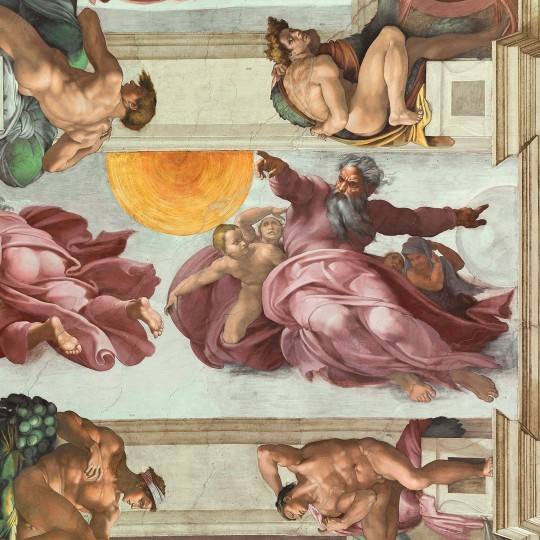
Book of Genesis
The Book of Genesis is the first book of the Jewish scriptures and the Old Testament of the Christian Bible. Genesis takes its name from the opening line in Hebrew – beresit, ("in the beginning") – later translated into Greek as genesis ("origin"). Genesis is the first text of what eventually became designated the Pentateuch, the Jewish Torah ("teachings"): five books of the Laws of Moses.
The Documentary Hypothesis
Genesis consists of a variety of literary details: myth, hymns, prayers, sacrifices, rituals, oracles, folk tales, and historical narratives. Tradition claimed that the first five books were written down by Moses, who passed them to his general Joshua when the Israelites arrived in Canaan from Egypt. In the 19th century, the social science disciplines of archaeology, anthropology, and sociology emerged and were utilized to study ancient civilizations and ancient texts. What is noteworthy in Genesis is that several of the stories are repeated, but with varying details. At times, the God of Israel is referred to as "Lord," but at other times as "God almighty." When this occurs we also find theological differences, as well as indications of changing historical contexts that included politics.
After the period of the united monarchy under King David and his son, Solomon (c. 900 BCE), two separate kingdoms were created: the Northern Kingdom of Israel and the South Kingdom of Judah. A way to explain the formation of the text was proposed by Julius Wellhausen (1844-1918), who taught at the University of Göttingen in Germany, in what became known as the Documentary Hypothesis. As we do not know who actually wrote the biblical texts, the various elements were assigned to a source:
J, the Jahwist, or Jerusalem source The Hebrew name of God (revealed in the book of Exodus) consisted of four consonants, YHWH ("I am that I am"), described as the tetragrammaton. We have the German J, for the pronouncement of the Y sound. The later Masoretic version added vowels, which gives us the English version, Jehovah (which does not appear in the Bible). The J source utilized anthropomorphic portraits of God; "the face of God," "the hand of God." In these texts, God often visits the earth.
E, the Elohim source The E comes from a form of the Canaanite el, pluralized as representing several aspects of the godhead, but also from the tribe of Ephraim, settled in the Northern Kingdom of Israel. The E source portrays God as a more abstract being who does not come to earth, but communicates through angels.
P, the Priestly source The P source is a collective term for priestly concerns. This includes the sacrifices, rituals, hymns, prayers, and the begats of Genesis. The Hebrew begat ("brought forth") was the term for procreation. All ancient cultures emphasized bloodlines in detailed genealogies. This validated concepts and practices handed down through the generations. In oral cultures, the repeated lists of the begats may have been a way to memorize oral traditions.
D, the Deuteronomist source This source was named after the last of the five books assigned to Moses (Deuteronomy). It is a collective term for the final form of the traditions that were written down. In 722 BCE, the Neo-Assyrian Empire invaded the Northern Kingdom, and refugees from the North migrated to Judah. This may be when northern traditions were first joined to southern traditions, combining the J and E sources.
In 587 BCE, the Babylonian Empire invaded Judah and destroyed the Temple of Solomon. At that time, some Jews were taken captive to the city of Babylon. This period is known as the Babylonian exile." The theory is that the "Deuteronomist," either a person or school of scribes, completed the final redaction, or editing, of all the combined sources while in Babylon, beginning c. 600 BCE, but with further editing over the next several centuries (in a range from 538-332 BCE).
Jews Mourning the Exile in Babylon
Eduard Bendemann (CC BY-SA)
Continue reading...
30 notes
·
View notes
Text
Divine Warriors
Here is some info dump about MCD's Divine Warriors in my rewrite, not all of this is known to the public of the mortal realm (especially the stuff about Shad.)
Irene the Matron: There isn't much known about Lady Irene's past, the only evidence they have are the scriptures Enki had written. Though most were burned. It is a common concept that she grew up in a small village (later Scaleswind) in Ru'aun. born from the ash of a god they say. She is incredibly strong, having healing magicks and the ability to bring those back from the dead as well as other abilities (mainly dimensional), Irene did not have a weapon. She can also change her form into a man but she rarely ever did this and it's said that she hated the form. After her disappearance (presumed death) which was 40 or so years after the fight with Shad. She was worshipped more commonly, which her worship later became widespread. Irene is worshipped as the god of medicine/health, the afterlife, agriculture and hope. She is associated with doves (because of her wings) and lavender, around churches and royalty/nobles homes, you will see statues of doves and fields of lavender. It's said that natural forming fields of lavender are places blessed by Irene. Although mainly worshipped in Ru'aun she is seen and heard all over the world.
Menphia the Fury: She grew up in Tu'la near the capital, one of the very few in Tu'la who was human. Menphia came from a well off noble family, she was a strong girl who could wield almost any close combat weapon. She became one of the princesses' guards at the age of 19. There was a rumor that Menphia and the princess were having an affair but it was never denied nor confirmed. She became a protector of Irene and later one of the Divine Warriors, she also had a pet tiger. Her magicks are very limited but they consist of strength and speed. Menphia used multiple different close combat weapons (swords, maces, battle axes, etc). She died during the fight with Shad to save Enki. She is worshipped mainly in Gal'ruk and Tu'la and usually by guards or soldiers. She is worshipped as the god of rage, strength, war, and courage. She is associated with tigers and fire. Her statues always have a tiger at her legs.
Shad the Destroyer: Not much is known about Shad at all, Enki himself destroyed practically everything that he had written about Shad. Them and Irene were close, the common conception was that they were lovers. Irene and Shad had a fight because he was a danger to mortals. Irene sealed Shad deep inside a mountain for 10 years, he later escaped and caused havoc. Although Irene and many of the other warriors had pushed her to their breaking point it was Shad himself who decided to be spiteful and become the Shadow Lord. Xavier was the first ever shadow knight. Their magicks consist of strength, telekinesis, and break dimension barriers. She can change their form much like Irene, to a woman, man, or a form of neither. He seems to enjoy this unlike Irene. Many depictions of Shad are different in gender because of this. Very few mortals worship him but she is seen as the god of deception, chaos, death, and tragedy. He is commonly associated with crows and lily of the valleys.
Enki the Keeper: Enki had many journals detailing both his and the other warriors lives yet he either burned most or hid them away, very few were actually found. He grew up in a home of warriors in Gal'ruk but despite this he became a scholar. He is known to have been in love with many, Menphia, Irene, Esmund's brother. Likely Xavier too. He was born without any magicks but he did know a bit of witchcraft. His abilities after getting a relic were; un-human observation, speed, and levitation. Enki barely fought but when he did he used an ink brush (much like Qiu Yongsi from Tianbao Fuyao lu). Enki died 5 or so years after the battle with Shad. He is worshipped in Gal'ruk and is a common figure head for literature. He is the god of; ink and paper, literature, language, and love. Enki is commonly associated with owls and snow.
Esmund the Protector: Much is known about him as he was the eldest son of one of the most well known historians, Ruthin Ro'meave. He grew up in Ru'aun, he became a guard and later became a Divine Warrior. Esmund was commonly known for his beauty that rivaled Irene's. He was deeply in love with Irene which caused a strain between Irene, Shad and Esmund. His younger brother was horrifically injured during a battle while under Shad's watch which caused Esmund to become even more resentful of Shad. Despite wanting to help defeat Shad he decided to stay behind and protect. He died 30 years before Irene's disappearance. He is worshipped in Ru'aun usually by Lords of villages seeking protection. He is the god of; protection, safety, loyalty, victory, and family. Esmund is associated with shields and jewlary.
Kul'zak the Wanderer: They grew up near the docks of Tu'la, they were a meif'wa. They helped with travel when ships docked on Tu'la. Kul'zak was the first Divine Warrior after Irene, and a nomad. They were a very good bard and a little mischievous. They were the oldest of the Divine Warriors and the one to have kept them all together. After the Divine Warriors split they traveled and spoke of legends for 10 years before dying. Unlike the other Divine Warriors they aren't worshipped in one place, they are worshipped as the god of; travel. merchants, alcohol and music. Kul'zak is associated with intoxication and the flute.
#aphmau minecraft diaries#minecraft diaries#aphmau#minecraft#mcd rewrite#aphmau mcd#mcd headcanons#divine warriors#irene aphmau#irene mcd#irene the matron#shad the destroyer#shad mcd#menphia the fury#kul'zak the wanderer#esmund the protector#enki the keeper#headcanon#aaron lycan#katelyn mcd#garroth ro'meave#travis valkrum#📜 | < . minecraft diaries
63 notes
·
View notes
Note
Elder Oaks says the church wants everyone to earn exaltation and that's why it only accepts marriage between a man and a woman, and not between two men. President Nelson said to "think celestial" and this includes "Physical intimacy is only for a man and a woman who are married to each other." How can you still go to church and be okay with this?
It's interesting that divorced people and single people don't fit what the LDS Church understands as the requirements for exaltation in the Celestial Kingdom and they aren't singled out for exclusion or face the same restrictions as queer people.
I find the LDS Church treats queer people differently from non-queer people for doing the same thing. For example, I know people who go by a nickname, even having it included on their Church records, and they don't have membership restrictions. I know women who legally change their name when they get married and they don't have membership restrictions placed on them. But if queer people do this, they face serious restrictions inside the Church.
And yet we read multiple times that God doesn't treat one group with favor over others, that "all are alike unto God." This thought appears multiple times in various ways across the scriptures. I believe and hope that churches will work their way towards this concept. I've seen the LDS Church increase the circle of inclusion, and hope this continues.
I had an experience where I believe God said it's fine to leave this church but I was invited to stay. I chose to stay for now. It doesn't mean I don't have differences with this church on queer topics or in other areas. I want this church to do better. Likewise, I want my state and nation to do better and don't agree with everything they do. Life is complex and institutions carry their historical baggage into the present and we work to make them better.
54 notes
·
View notes